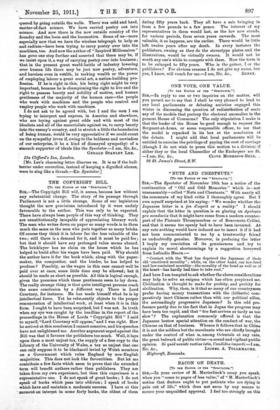"NUTS AND CHESTNUTS."
[TO THE EDITOR OT THE " SPECTATOR."] SIR,—The Spectator of November 18th has a notice of the
continuation of " Old and Odd Memories " which is—not unseasonably—called "Nuts and Chestnuts." With nearly all the comments of my kind critic I thoroughly agree. But t
own myself surprised at his saying : " We wonder whether the- Japanese letter is a jeu d'esprit or a reality." I should
explain that the letter in question is so glaring an Apologia pro mendaciis that it might have come from a modern counter- part of the Platonic Thrasymachus or of Benvenuto Cellini, and that it seems too openly bad to have been invented. At any rate nothing would have induced me to insert it if it had not been communicated to me by a trustworthy friend as undoubtedly genuine. Moreover, in prefacing the letter I imply my conviction of its genuineness and try to explain its moral shortcomings by a suggestion borrowed from Lafcadio Hearn:-
" Contact with the West has deprived the Japanese of their old emotional morality' ; while, on the other hand, our law-bred. and law-sustained morality—the morality of the head as well as of the heart—has hardly had time to take root."
And here I am tempted to ask whether the above con siderations- may help to solve an enigma which has often perplexed me. Civilization is thought to make for probity, and probity for civilization. Why, then, is it that so many of our countrymen prefer having money transactions with the (hitherto) com- paratively inert Chinese rather than with our political allies, the astoundingly progressive Japanese P Is this odd pre- ference partly due to the fact that in Japan the progress may have been too rapid, and that " too fast arrives as tardy as too slow " ? The explanation commonly offered is that the Japanese bestow special attention on the conduct of war, the Chinese on that of business. Whence it follows that in China it is not the soldiers but the merchants who are chiefly brought under the control of what is, among Orientals at any rate, the great bulwark of public virtue—a sound and vigilant public opinion. Si quid novisti rectius istis, Candidus imperti.—I am, Highcroft, Boscambe.


















































 Previous page
Previous page